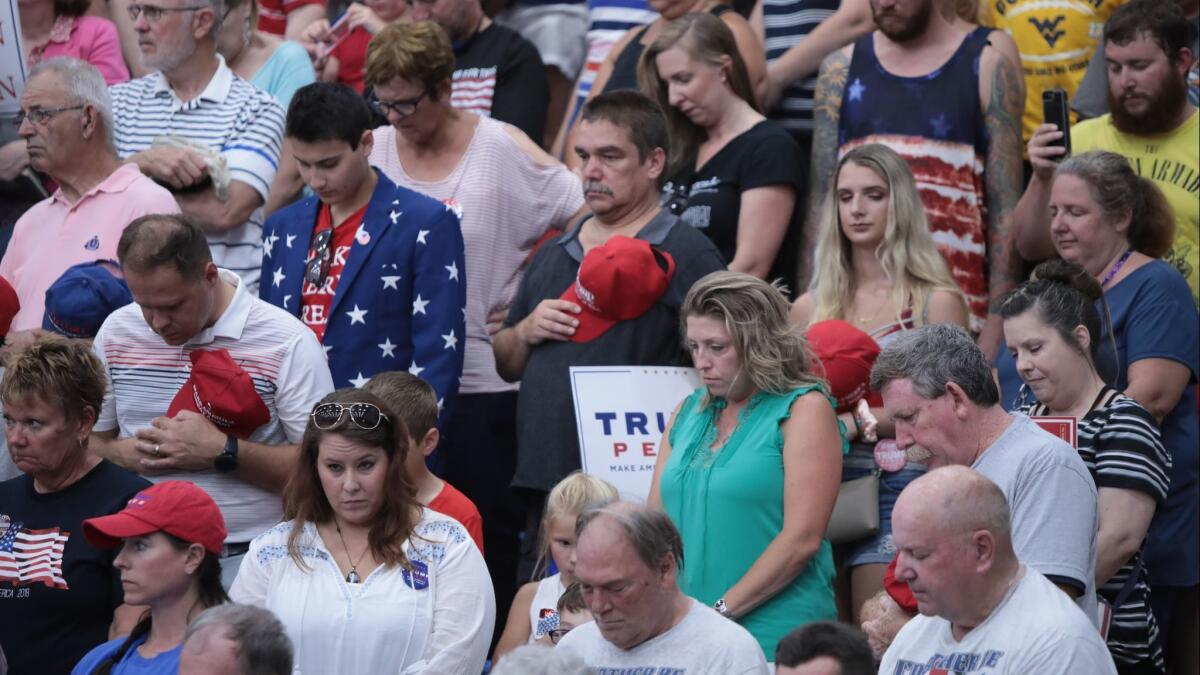Trump’s core support remains solid, but a significant minority of Republicans have soured, study finds

- Share via
Reporting from Washington — President Trump’s backing from his core supporters has been famously solid — Trump himself once joked that he could shoot someone on New York’s Fifth Avenue without jeopardizing their votes.
But that steadfast backing coexists with a less positive fact for the president: Nearly 1 in 8 Trump voters from 2016 have soured on him since he took office, according to a new study by the nonpartisan Pew Research Center.
For the record:
10:20 a.m. Aug. 10, 2018An earlier version of this article incorrectly said the Pew Research Center found nearly 1 in 5 Trump voters from 2016 has soured on President Trump since he took office. Actually, nearly 1 in 8 has soured on him since his tenure started. An additional 8% of Trump voters had a sour view of Trump at the time he was elected and still do.
The numbers come from a survey Pew conducted of 3,014 voters who took part in a panel that was questioned three times during 2016 and then again in 2018. Each time, they were asked to rate their feelings about Trump on a 0-to-100 scale.
Because the same people were questioned each time, pollsters could track which individuals changed their minds about Trump.
Based on that, Pew put Trump’s voters into one of four categories:
About 6 in 10 of those who voted for Trump in 2016, the Enthusiasts, had warm feelings toward him all along, going back to the Republican primaries in the spring of 2016, and continue to feel warmly toward him.
Another group, making up just over 2 in 10 of Trump’s voters were the Converts. They had chilly feelings toward Trump during the Republican primaries, but warmed to him once he became the Republican nominee and have remained warm ever since.
Those groups, together, continue to make up Trump’s core support. On the 0-100 thermometer, they rate their feelings toward Trump, on average, in the mid-80s.
Two other groups are more problematic for the president.
About 1 in 8 people who voted for Trump in 2016 fall into the group Pew labeled as Skeptics. They had chilly feelings toward Trump during the primaries, warmed to him during the general election, but quickly soured again. On average, they currently rate their feelings toward him at a low 33 on the scale.
By comparison, people who voted for Hillary Clinton rate their feelings toward Trump at a frosty 8.
A final, smaller group, the Disillusioned, had warm feelings toward Trump during the primaries and on through the election, but have turned cold since he became president. They made up 6% of Trump’s voters.
Another problem for Trump is that while about 1 in 5 of his voters have grown colder toward him, few on the other side have warmed. Among Clinton voters, 88% gave Trump ratings in the “very cold” range, a share that has actually grown since the election, Pew found.
On the other hand, the fact that voters have grown colder toward Trump doesn’t necessarily mean they wouldn’t vote for him if he runs again. In 2016, a significant number of voters cast ballots for Trump even though they disapproved of him; their negative feelings toward Clinton were greater.
Get the latest news from the nation’s capital on Essential Washington >> »
The study also highlighted a big gender gap in feelings toward Trump. A majority of Trump Enthusiasts and Converts are men. By contrast, more than 60% of the Skeptics and Disillusioned Trump voters are women.
Trump Enthusiasts are also disproportionately white voters who did not graduate from college — a finding that jibes with the attendance at the president’s campaign rallies.
Non-college-educated, white voters made up about two-thirds of those who voted for Trump in 2016 and about three-quarters of the Trump Enthusiasts, the study found.
By contrast, non-white voters made up almost 4 in 10 of those who cast ballots for Clinton, and only about 1 in 10 Trump voters.
Blue-collar whites have been declining as a share of the U.S. electorate as the country grows more racially and ethnically diverse and more highly educated. But whites who do not have a college degree remain the largest single slice of the electorate — about 44% of those who voted in 2016, according to Pew’s data. Trump carried them by more than a 2-1 margin.
Whites with college degrees made up about 30% of the voters, and non-whites about 25%. Non-whites are much more heavily represented among those who did not vote in 2016, making up almost half the non-voters.
Twitter: @DavidLauter
More to Read
Get the L.A. Times Politics newsletter
Deeply reported insights into legislation, politics and policy from Sacramento, Washington and beyond. In your inbox twice per week.
You may occasionally receive promotional content from the Los Angeles Times.










